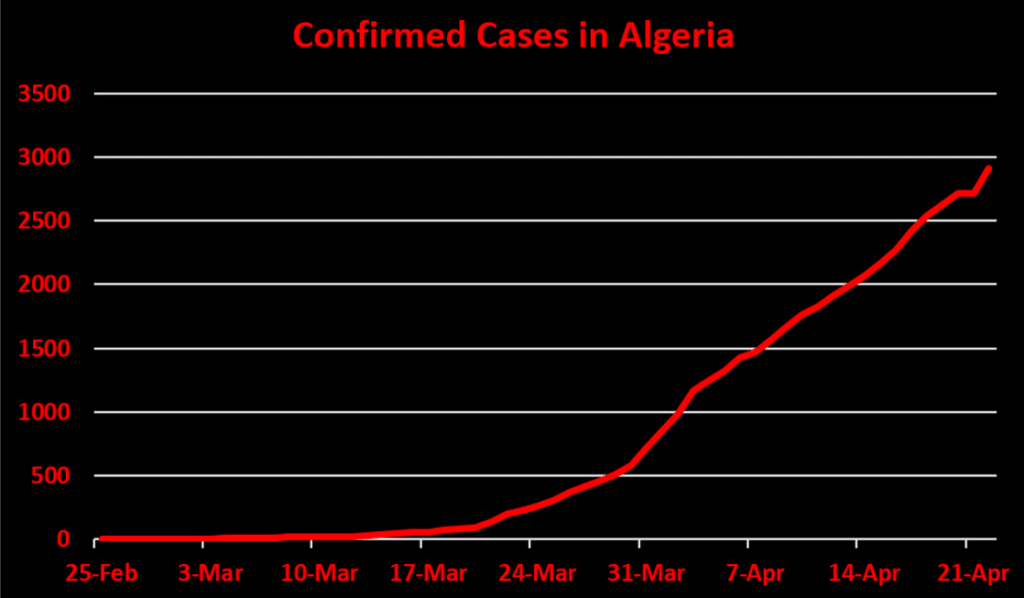April 23, 2020 | Policy Brief
Algeria’s ‘Revolution of Smiles’ Democracy Movement Hit Hard by COVID-19
April 23, 2020 | Policy Brief
Algeria’s ‘Revolution of Smiles’ Democracy Movement Hit Hard by COVID-19
The coronavirus outbreak has provided Algeria’s regime a pretext to consolidate its political control by repressing independent media and activists affiliated with the Hirak democratic protest movement. Yet as an economic crisis looms and popular unrest continues to fester, Algeria could be poised for a renewed bout of political upheaval once the COVID-19 crisis eventually passes.
Situation Overview
Algeria reported its first confirmed case in late February, an Italian national who had recently entered the country. As of April 23, Algerian authorities have reported 2,910 confirmed cases, including 402 deaths. The true numbers are no doubt significantly higher given Algeria’s opaque reporting structures and dilapidated public health system, whose disrepair inspired protests in 2018.
In mid-March, Algerian authorities suspended all air and sea travel to and from Europe and halted flights with African countries. The government also shut down public transportation, universities, schools, restaurants, cafes, and mosques as well as border crossings and ferry services. On March 23, authorities announced a military-enforced nighttime curfew in Algiers and a full lockdown in Bilda province, the outbreak’s epicenter. The government subsequently expanded the curfew to Algeria’s remaining provinces and extended the Bilda lockdown until at least April 29.
COVID-19 in the Greater Middle East
| Country | Cases | Deaths |
| Turkey | 98,674 | 2,376 |
| Iran | 87,026 | 5,481 |
| Israel | 14,592 | 191 |
| Saudi Arabia | 12,772 | 114 |
| Pakistan | 10,513 | 224 |
| UAE | 8,756 | 56 |
| Qatar | 7,764 | 10 |
| Egypt | 3,659 | 276 |
| Morocco | 3,537 | 151 |
| Algeria | 2,910 | 402 |
| Kuwait | 2,399 | 14 |
| Bahrain | 2,027 | 7 |
| Iraq | 1,631 | 83 |
| Oman | 1,614 | 8 |
| Afghanistan | 1,226 | 40 |
| Tunisia | 909 | 38 |
| Lebanon | 688 | 22 |
| W. Bank & Gaza | 480 | 4 |
| Jordan | 435 | 7 |
| Somalia | 286 | 8 |
| Sudan | 162 | 13 |
| Libya | 60 | 1 |
| Syria | 42 | 3 |
| Yemen | 1 | 0 |

Data current as of 8:30 AM, April 23, 2020.
Implications
In mid-March, Algeria’s COVID-19 outbreak interrupted what would have been the 57th consecutive round of semi-weekly Hirak demonstrations. The “Revolution of Smiles,” Algeria’s largest peaceful protest movement since its independence in 1962, began in early 2019, eventually toppling longtime Algerian ruler Abdelaziz Bouteflika last April.
But Bouteflika’s resignation did not usher in the radical democratic reform for which the Hirak activists had hoped. Algeria’s powerful military maneuvered to shape the nation’s political transition and regain the political dominance it had lost under Bouteflika. Algeria’s new president, Abdelmadjid Tebboune, a Bouteflika loyalist and military ally, claimed victory in a December 2019 election most Algerians rejected as invalid. Algeria’s military chief, General Ahmed Gaid Salah, remained the country’s de facto leader until he suffered a fatal heart attack on December 23, shortly after Tebboune’s inauguration.
Democratic reformers hoped Salah’s death would provide an opportunity to push the military out of politics. The military, however, remains determined to preserve its power.
Algerian authorities are now exploiting the COVID-19 lockdown to stifle the Hirak protest movement. Since late March, authorities have wrongfully detained and convicted numerous Hirak activists, including the popular opposition politician Karim Tabbou. Khaled Drareni, an Algerian Reporters Without Borders journalist, suffered a similar fate. In early April, these arbitrary crackdowns led Reporters Without Borders and a group of Algerian NGOs to condemn “the Algerian authorities [for] taking advantage of the coronavirus epidemic to settle scores with independent journalism.”
What to Watch for
The massive drop in oil prices triggered in part by the COVID-19 crisis is pummeling Algeria’s energy export-dependent economy. Halim Cherifi, a banker in Algiers, warned, “We will soon start to feel a big crisis unless oil prices go back up.”
The country’s foreign currency reserves plummeted to less than $60 billion in late March, down from nearly $80 billion in late 2018 and more than $97 billion a year prior. According to Luis Martinez, a North Africa expert at France’s Sciences Po University, Algeria is teetering “on the edge of a financial abyss.”
If Algeria’s foreign reserves continue their steep decline, the ensuing crisis will likely trigger massive social unrest, adding to Algerians’ frustration with their country’s illiberal and incompetent political system. As Martinez put it, “It is not the year 2020 that’s on trial, but the 20 years of patronage, nepotism and corruption” of the Bouteflika regime and its successor.
While COVID-19 has temporarily restrained the Hirak movement, frequent protests likely will resume once the public health crisis has abated. With an economic crisis added to the mix, the protests may return stronger than ever, auguring further upheaval in Algeria’s already tumultuous political system.
Benjamin Weinthal is a research fellow at the Foundation for Defense of Democracies (FDD), where he also contributes to FDD’s Center on Economic and Financial Power (CEFP). For more analysis from Benjamin and CEFP, please subscribe HERE. Follow Benjamin on Twitter @BenWeinthal. Follow FDD on Twitter @FDD and @FDD_CEFP. FDD is a Washington, DC-based, nonpartisan research institute focusing on national security and foreign policy.